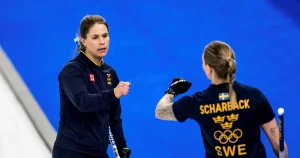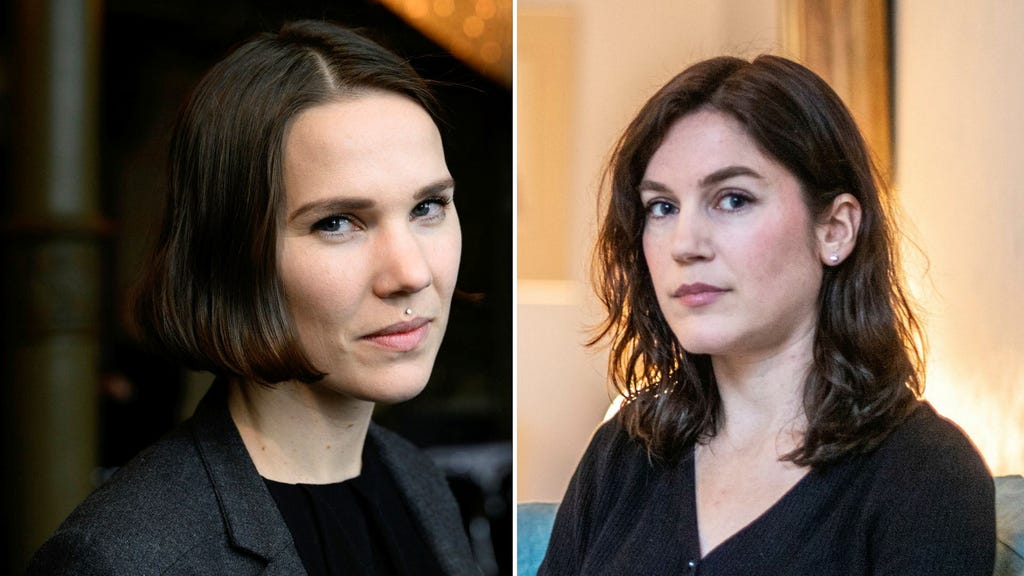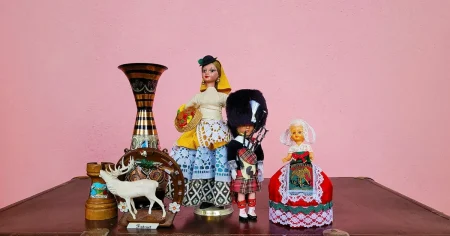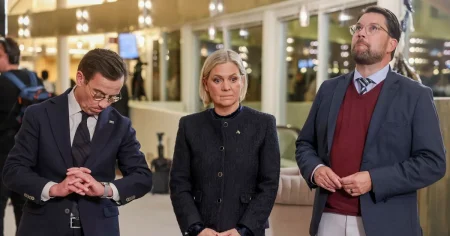The Swedish podcast ”Gästabudet,” known for its often scathing literary criticism, has once again awarded its annual prize for the most cutting review. While the podcast’s energy is undeniably infectious and attracts a loyal listenership, its underlying motivations are increasingly coming under scrutiny. Greta Schüldt questions whether hosts Mikaela Blomqvist and Lyra Ekström Lindbäck are genuinely interested in elevating the status of literary criticism, or if their project serves another, perhaps less noble, purpose. This recurring question stems from the podcast’s tendency to prioritize entertainment value over nuanced critical analysis, often resorting to hyperbole and performative outrage, which could potentially undermine the very field they claim to champion. The tension between entertainment and serious critique raises concerns about the broader impact of ”Gästabudet” on the literary landscape.
”Gästabudet” has undeniably carved a niche for itself in the cultural sphere, attracting a diverse audience drawn to its irreverent and often humorous approach to literary discussion. The hosts’ charisma and witty banter contribute significantly to the podcast’s appeal, making even complex literary concepts accessible to a wider audience. However, the focus on entertainment frequently comes at the expense of rigorous critical engagement. Reviews often devolve into subjective pronouncements and personal attacks on authors, rather than exploring the merits and flaws of the literary works themselves. While humor and personal perspective can be valuable tools in literary criticism, their overuse in ”Gästabudet” risks trivializing the critical process and undermining the very notion of objective analysis. This emphasis on entertainment raises questions about whether the podcast truly contributes to a deeper understanding and appreciation of literature, or merely serves as a platform for performative criticism.
The annual ”sawing” award, a celebration of the most eviscerating review, further underscores the podcast’s predilection for negativity. While critical assessments are crucial for literary discourse, the celebratory nature of this award arguably fosters a culture of cynicism and negativity. By focusing on the most destructive critiques, ”Gästabudet” inadvertently encourages a reductive approach to literary analysis, where tearing down a work becomes more valued than engaging with its complexities. This emphasis on negativity not only potentially discourages aspiring authors but also reinforces the perception of literary criticism as an inherently hostile and destructive force. Furthermore, the award itself could be interpreted as a cynical marketing ploy designed to generate controversy and attract more listeners.
Moreover, the hosts’ positioning as self-proclaimed outsiders to the established literary world contributes to the podcast’s appeal but also raises concerns about their critical authority. While challenging established norms and perspectives is essential for a vibrant literary culture, the hosts’ frequent dismissal of academic criticism and established literary conventions creates an ”us vs. them” dynamic that can be both alienating and counterproductive. This anti-establishment stance, combined with their often-personal attacks on authors, suggests a potential lack of respect for the literary field they claim to champion. By constructing this dichotomy, ”Gästabudet” risks perpetuating a simplistic view of literary criticism as a battleground between insiders and outsiders, rather than a collaborative pursuit of understanding and appreciation.
The potential consequences of ”Gästabudet’s” approach to literary criticism extend beyond the immediate sphere of the podcast. By prioritizing entertainment and negativity, the podcast risks shaping public perception of literature and its critical analysis. The emphasis on scathing reviews may discourage readers from exploring new works, fearing they too will be subjected to public ridicule. This chilling effect could have detrimental consequences for the literary landscape, potentially limiting the diversity of voices and perspectives that are published and discussed. Furthermore, the podcast’s popularity may inadvertently legitimize a form of criticism that prioritizes personal attacks and emotional responses over thoughtful engagement with literary texts. This normalization of negativity could erode the credibility of literary criticism as a whole.
Ultimately, the question of ”Gästabudet’s” true intentions remains unanswered. While the podcast undoubtedly generates lively discussion and engages a wide audience with literature, its focus on entertainment and negativity raises legitimate concerns about its long-term impact. Whether the hosts are genuinely committed to elevating the status of literary criticism or simply capitalizing on the appeal of controversy remains open to debate. However, it is crucial to critically examine the methods and motivations of any platform that wields significant influence over the literary landscape, ensuring that the pursuit of entertainment does not overshadow the essential function of thoughtful and rigorous critical engagement. The future of literary discourse depends on a nuanced approach that balances entertainment with intellectual rigor, fostering a culture of appreciation and understanding rather than one of cynicism and negativity.














